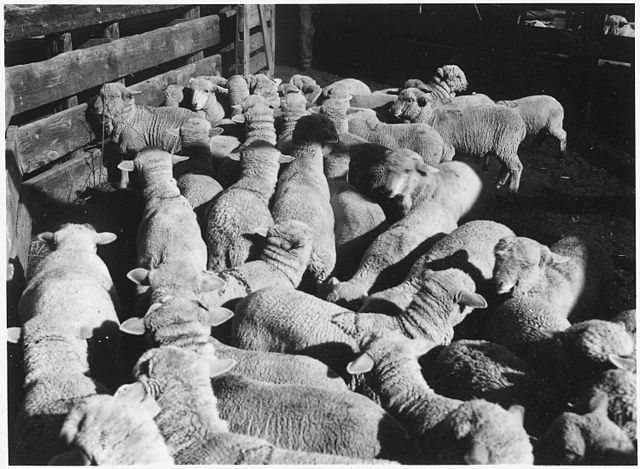 |
| Judith and Peter, an intimate moment |
The single illustration from Marie Manning’s Judith of
the Plains (right) would suggest that it’s
another romance, but she’s got a lot more on her mind than that. Depending on
how you count, there are two main plots and parts of at least two others. They
overlap somewhat, though each has its own emotional center.
Plots. Mary
Carmichael is a young girl from the East who arrives in Wyoming to take a job
as a governess for a sheep rancher in the Wind River Mountains. Her arrival
after a long, uncomfortable cross-country train trip and a rough ride by coach
across the prairie echoes the schoolmarm Molly’s arrival in Wister’s Medicine
Bow, Wyoming.
Eventually arriving at her destination, she discovers that
her employer, Mrs. Yellett, operates out of a camp and does without a ranch house, her family sleeping rough with only the starry sky for a roof. Her six children have never
learned to read or write. What's more, Mary learns, they have no more interest in schooling
than the sheep do that they help herd.
 |
| Wind River Range, Wyoming |
In her first days in Wyoming, she meets the Judith of the
title. Judith Rodney is a postmistress, delivering mail at a road ranch, where
the local cowboys gladly gather to banter with her. She’s single and pretty,
educated at a convent school. Her brother, Jim Rodney, is a rustler, who has
already done time in the state pen at Rawlins. Both have an Indian grandfather, their
grandmother a white woman raised as a Sioux.
Jim Rodney has good reason to carry a grudge against the
local cattlemen. He had been a prospering sheep man, until he was brutally run
off the range, his herd driven over a cliff to their deaths. His wife and
children now live in poverty in an abandoned cabin deep in the
criminal-infested hills.
Sworn to take revenge on a man named Simpson, who was
responsible for the deed, Rodney sabotages a cattle roundup. He stampedes the
herd while Simpson is riding night guard, and the man is killed. The foreman
and some of his men then seek Rodney out and hang him.
 |
| Mixed blood Choctaw children, 1908 |
Romance. The likely
beau for Judith is a transplanted Easterner, a cowboy named Peter Hamilton.
Though he and Judith are friendly, he is distracted by a moth-to-the-flame
obsession with a girl he once met while a student. Kitty Colbrooke is a
published poet (and you don’t get many of those in westerns) with a literary
following. And she’s also several years older than him.
When she shows up as a guest at a ranch within a day’s ride,
he is off and running in hopes that marriage has become a more agreeable
prospect to her than it was the last time he asked. It’s not, but his
attentions do appeal to her vanity, and so he is stuck like a fly on a
fly-strip, while Judith observes from afar, heartsick.
Peter cannot, in fact, claim much that is to his credit. He
has tediously conventional notions about women and courtship. He also prefers
the cream puffery of a fashion-conscious Eastern girl to the womanly beauty of
feature and character to be found in Judith. An added obstacle for him is her family—there’s that Indian grandfather—and her ex-con, cattle-rustling brother.
Still, she is fond of him. When he finds her one night on a
fearsome mountain trail, he hugs her to him protectively as they ride along
together. Her heart melts. It isn’t until he sees the brave face she puts on to
mask the grief at her brother’s hanging that he discovers the full depth of his
love for her.
 |
| Sheep, Wind River Agency, Wyoming, |
Character. Unlike
many westerns of the period, Manning’s story has little to illustrate on the
subject of character. Judith comes closer than any man in the novel to
exhibiting admirable traits. She is strong and independent, courageous, brave.
When we first meet her, we like her for her composure when she is teased by the
cowboys who would happily be her suitors. As the story develops, she wins our
respect as she attempts to protect her troubled brother.
Although it’s a comic role, Mrs. Yellett would come in
second for strength of character. She has the polish of a potato freshly
unearthed, but she is formidable as a businesswoman, running a big, prospering
sheep operation. She has no need for fashion or convention—or bathing. She
lives by a homespun moral code that she quotes with aphorisms from a “Book of
Hiram,” though we gather that like her children, she cannot read or write.
She does a man’s work, fearlessly driving a team of horses
over perilous terrain, pulling a wagon precariously loaded with barrels of
sheep dip. And she does not complain that her grumpy husband, now eighty,
doesn’t lift a finger to help. At his age, he’s earned his rest, so far as
she’s concerned.
| Washington, D.C., c1900 |
Wrapping up. Turns
out Marie Manning (1872-1945) was not to be remembered as a novelist, but as
the Abigail Van Buren of her day. In 1898, while writing for the women’s pages
of the New York Evening Journal, she originated the nation’s
first personal advice column, “Dear Beatrice Fairfax.”
Born in Washington, D. C., she lived most of her life there.
One earlier novel, set in England, preceded Judith of the Plains, and in the 1940s she published two more. During
1900-1920, she published numerous stories in Harper’s and other slick magazines.
Judith of the Plains
is currently available at google books and Internet Archive, and for kindle and
the nook. For more of Friday’s Forgotten Books, jump on over to Patti Abbott’sblog.
Photo credits: Wikimedia
Commons
Coming up: Saturday music, Bob Wills
This sounds like a very interesting read!!!
ReplyDeleteI really like that top illustration. Seems to capture the mood perfectly.
ReplyDeleteIn older books I can't usually get past the dated writing styles and literary conventions. I admire your ability to do that and give these novels a fair shake. Thanks, Ron!
ReplyDeleteAnd I am delighted you continue to find women writers from that era.
ReplyDelete